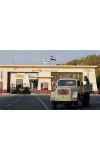
05 May 2012 01:32:37
Although PalFest, a travelling festival established in 2008, has tried to reach Gaza in the past, it has never been successful. This year it applied to the Egyptian ministry of foreign affairs on 18 April for 43 travel permits for writers and artists to enter through the Rafah crossing from Egypt. Organisers say they were told it could take up to 10 days to process the permits, but they have yet to be issued. A press conference scheduled for this afternoon in Cairo, at which the Egyptian authors Ahdaf Soueif, Ghada Abdel Aal and Sahar el-Mougy, blogger Samia Jaheen, blogger and activist Alaa abd el-Fattah and reporter Amr Ezzat were set to push the government to issue the permits and open the border, has just been postponed following violence in the city, but organisers said they were still committed to reaching Gaza.
"Fourteen months on from the fall of [President Hosni] Mubarak, protesters are still being killed on the street and Gaza is still being starved," they said in a statement this morning. "We are committed to reaching Gaza, but cannot stand and request permits from the government while such violence plagues the streets."
PalFest, a festival of public events, student workshops and meetings with civil society leaders, is set to run from 5 to 9 May in Gaza, with an initial event in Ramallah on the 5 May and a finale in Cairo on the 11 May. Supported by organisations including Arts Council England and the British Council, with patrons including Chinua Achebe, Seamus Heaney and Philip Pullman, it endorses the Palestinian call for the academic and cultural boycott of Israel, and states as its mission the reinvigoration of "cultural ties between Arab countries, ties that have been eroded for too long". Soueif is its founding chair.
"Justice for Palestine was among the most urgent demands of the Arab revolutions. In Egypt, Tahrir called for the Rafah crossing to be opened – yet the movement of people and goods remains severely restricted. PalFest has always worked to forge cultural ties and now, more than ever, regional and global partnerships must be used to place justice for Palestine at the centre of the growing global struggle for justice," said the festival's producer Omar Robert Hamilton.
Dr Haidar Eid, a literature professor at Gaza's Al-Aqsa University, said the festival was "a sign of the growing solidarity across borders in our struggle against racism and oppression".
"Intellectuals and writers played a key role in ending apartheid in South Africa; likewise, Arab cultural figures are visiting Gaza this year to show solidarity with Palestinian academics and artists in support for their call to increase the global BDS [Boycott Divestment and Sanctions] campaign against apartheid Israel," he said. "On behalf of the Palestinian Campaign for the Academic and Cultural Boycott of Israel, we deeply appreciate the Arab writers' principled and consistent support for the Palestinian civil struggle for justice and peace in Palestine."

